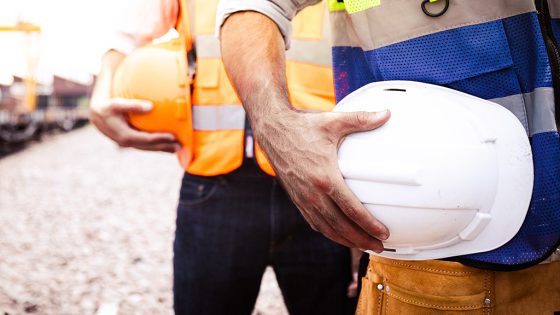Jobs reforms: construction employers urged to become more inclusive

Key industry bodies have urged the construction industry to grasp opportunities to become more inclusive and keep people in work longer.
Following prime minister Keir Starmer’s launch of reforms to support people back into work, sector bodies urged companies to take advantage of initiatives to attract and hold on to a diverse range of talent.
Starmer said on Tuesday (26 November) that the government planned to help people who “for too long haven’t been getting the support they need to get back to work”.
This includes reforming Jobcentres, boosting mental health support and commissioning an independent review of how companies can be aided to employ people with disabilities and health conditions.
Inform and enable
Deborah Madden, executive director, nations engagement, at skills body the Construction Industry Training Board (CITB), said the sector had “numerous challenges” in attracting a diverse workforce.
But she added: “CITB works with the Supply Chain Sustainability School to provide free-to-access training guidance and support on diversity across the entire sector, and that programme has a great take-up, with all sizes of companies accessing that support.”
Madden said one of three pillars in the skills body’s latest business plan was to inform and enable diverse and talented people into construction.
“We’ve also invested £267m to help the industry improve diversity, quality and productivity,” she added. “For example, our Industry Impact Fund – which supports employers in areas like equality, diversion and inclusion; recruitment; and retention – helps employers to design and test new solutions to address a variety of challenges facing the industry.
“We recognise the need for the industry to recruit those from under-represented groups, primarily when related to sexuality, ethnicity, age and disability, and we are supporting the industry to address this to ensure it becomes more inclusive.”
Sustainable careers
Sarah Bolton, chief executive of the construction sector support initiative Lighthouse Charity, said it was critical for the industry to reach out beyond its traditional boundaries.
“We need to offer opportunities to those who may not have considered a career in construction or to those that may be facing societal discrimination,” she said.
“Encouraging people to start a conversation about any issues they may be facing is fundamental in helping to reduce the stigma around poor mental wellbeing. We also need to ensure that those entering our industry feel they have a sustainable career where they feel supported in an inclusive environment and equipped to deal with the challenges of daily life.
“We have delivered several proactive initiatives that do exactly that, along with a variety of services that support our construction community every hour of the day.”
Recruit more widely
Civil Engineering Contractors Association chief executive Alasdair Reisner said securing the workforce needed was “perhaps the biggest challenge faced by businesses across the sector”.
“Given this, we should never close off the route for anyone who wants to join the sector,” he added.
“We see brilliant work across the sector – by individual companies, trade associations and bodies such as the Supply Chain Sustainability School – to develop and promote good practice.
“Firms that engage with this report that they are able to recruit more widely, helping them to meet their skills needs as an inclusive employer. But there is still far more to be done to make this custom and practice across the sector as a whole.”
Societal pressures
Construction Plant-hire Association chief executive Steven Mulholland said greater awareness of social pressures outside the workplace was critical.
“As employers, we also have to bear in mind societal pressures. There are drugs, alcohol dependency and social media. They are outside the working environment but people sometimes bring them in. Social problems are much more diverse and we have to find a way to deal with that.”
Seismic skills challenges
Jason Poulter, national officer at trade union Unite, said working in construction in the UK was “the most precarious employment in Europe”.
He added: “This instability affects both family life and mental health.”
Poulter called for ministers to ensure projects were delivered with better terms and conditions for workers.
“This would be a small first step in better regulating the industry to help ensure that workers who have physical and mental challenges are treated more fairly. It would also reinvigorate apprenticeship delivery, which is essential to meet the seismic skills challenges facing construction.”
Decent jobs
Starmer said this week: “From the broken NHS, flatlining economy and the millions of people left unemployed and trapped in an inactivity spiral – this government inherited a country that simply isn’t working.”
He added: “Our reforms put an end to the culture of blaming and shaming people who for too long haven’t been getting the support they need to get back to work. Helping people into decent, well-paid jobs and giving our children and young people the best start in life – that’s our plan to put more money in people’s pockets, unlock growth and make people better off.”
Rail megaproject partners with support charity
The £2bn Transpennine Route Upgrade (TRU) has entered a programme-wide partnership with the Lighthouse Charity.
The arrangement provides funding to the organisation as well as making its services available to staff on the rail megaproject at all times.
TRU head of health and wellbeing Andy Picken said: “This is a great addition to the TRU wellbeing programme, and an equitable approach to offering wellbeing support right across a complex and multi-organisational programme.
“The Lighthouse Charity is a single point of access to a plethora of emotional, physical and financial wellbeing guidance, resources and support.
“It offers a dynamic collection of wellbeing services under one roof that works with the entire workforce regardless of employing company or contract type and tackling the industry’s biggest wellbeing issues with a host of preventative services to support better physical and mental wellbeing, providing vital support services in times of need.”
Lighthouse Charity chief executive Sarah Bolton added: “We are delighted to be partnering with TRU to spread a positive wellbeing message across its programme and ensuring its teams know about and feel able to access the support they need.
“As well as our reactive support channels, our Wellbeing Academy also ensures that the workforce is able to access the soft skills training it needs to navigate and manage today’s challenges both at work and home.”
If you or anyone you know is struggling, reach out for 24/7 free and confidential support now via the Lighthouse Charity:
24/7 helplines: 0345 605 1956 (UK) 1800 939 122 (ROI)
Live chat: www.lighthouseclub.org
Text HARDHAT to 85258



